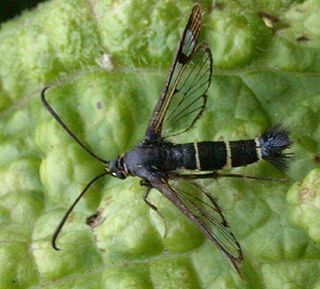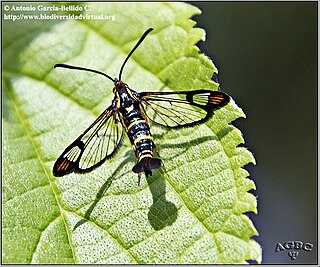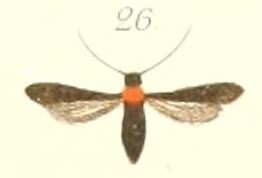
The Sesiidae or clearwing moths are a diurnal moth family in the order Lepidoptera known for their Batesian mimicry in both appearance and behaviour of various Hymenoptera.

The hornet moth or hornet clearwing is a large moth native to Europe and the Middle East and has been introduced to North America. Its protective coloration is an example of Batesian mimicry, as its similarity to a hornet makes it unappealing to predators. The hornet moth has been linked to the large dieback of poplar trees across Europe because its larvae bore into the trunk of the tree before re-emerging as adults.

Synanthedon culiciformis, known as the large red-belted clearwing, is a moth of the family Sesiidae. It is found in the Palearctic and Nearctic realms.

Synanthedon vespiformis, the yellow-legged clearwing, is a moth of the family Sesiidae. It is found in the Palearctic realm.

Bembecia ichneumoniformis, the six-belted clearwing, is a moth of the family Sesiidae.

Synanthedon andrenaeformis, the orange-tailed clearwing, is a moth of the family Sesiidae. It is known from most of Europe. It is also present in the Near East.

Synanthedon formicaeformis, the red-tipped clearwing, is a moth of the family Sesiidae and can be found in all of Europe, the eastern Palearctic realm, and the Near East. The larvae sometimes form pear-shaped galls on willows. It was first described by Eugenius Johann Christoph Esper in 1783.

Microsphecia brosiformis is a moth of the family Sesiidae. It is found from the Balkan Peninsula to the Crimea, southern Russia (Sarepta), Asia Minor, the Caucasus, Iran, Turkmenistan and Afghanistan.

Synanthedon stomoxiformis is a moth of the family Sesiidae. It is found in most of Europe and the Middle East.

Bembecia scopigera, the six-belted clearwing, is a moth of the family Sesiidae. It is found from central Spain over most of south-western and central Europe, the Balkans, Greece, southern Russia and Ukraine to Turkey.

Pyropteron triannuliformis is a moth of the family Sesiidae. It is found from most of Europe to the Near East and Central Asia.

Chamaesphecia bibioniformis is a moth of the family Sesiidae. It is found in southern Europe and from Asia Minor to Kyrgyzstan.

Chamaesphecia masariformis is a moth of the family Sesiidae. It is found in south-eastern Europe, Turkey, northern Iran, the Middle East, the Caucasus, southern Russia, Uzbekistan and Tajikistan.
Pyropteron affine is a moth of the family Sesiidae. It is found in most of Europe, except Ireland, Great Britain, the Netherlands, Denmark, Fennoscandia, the Baltic region, Poland and Bulgaria. It is also found in Asia Minor, Georgia, the Middle East and North Africa.

Synanthedon cephiformis is a moth of the family Sesiidae. It is found in Central Europe and Eastern Europe.

Synanthedon conopiformis, Dale's oak clearwing, is a moth of the family Sesiidae. It is found in almost all of Europe, except the north.
Synanthedon mesiaeformis is a moth of the family Sesiidae. It is found in France, Spain, Lithuania, Poland, the Czech Republic, most of the Balkan Peninsula, Finland, Russia and Asia Minor. The species prefers solitary trees on meadows, in parks and along streams.

Synanthedon scoliaeformis, the Welsh clearwing, is a moth of the family Sesiidae. It is found from almost all of Europe, east through Russia to Japan.
Max Bartel was a German entomologist, who erected the Ischnarctia genus in 1903.

The Tinthiinae are a subfamily of clearwing moths, first established in 1917 by Ferdinand Le Cerf.













